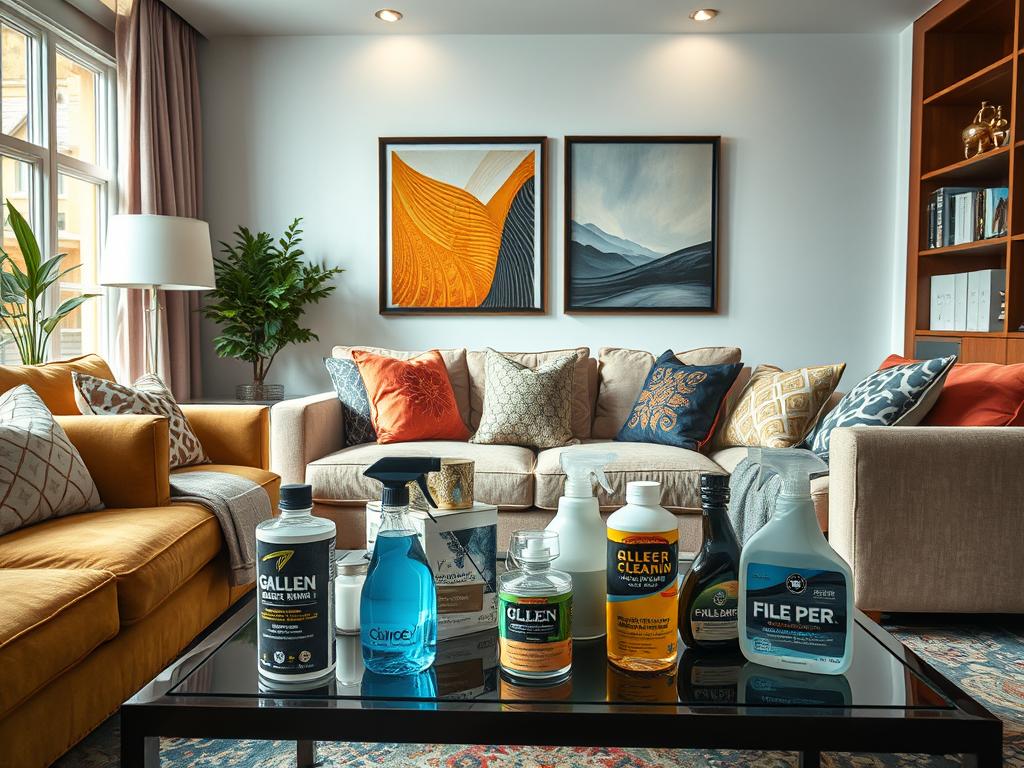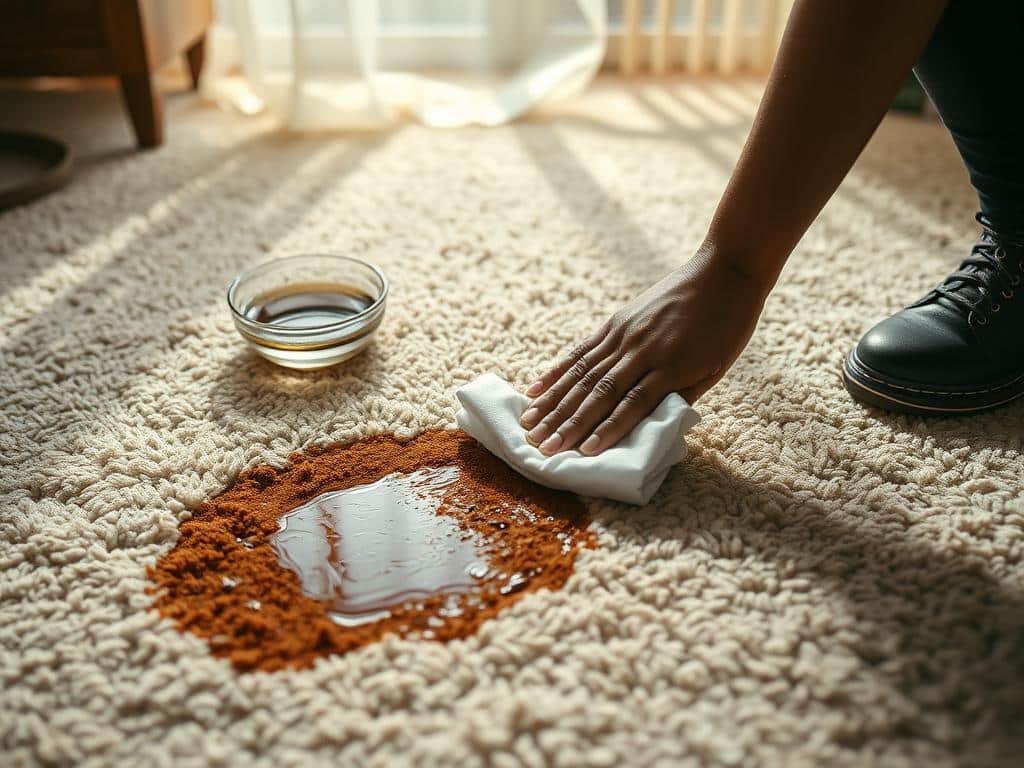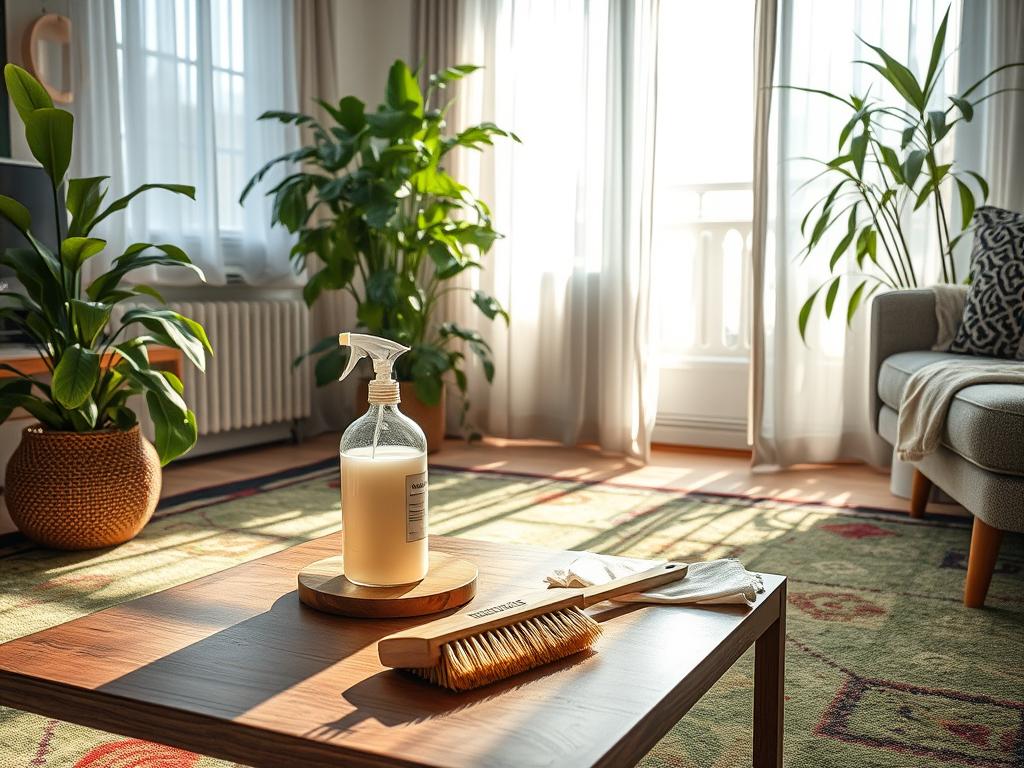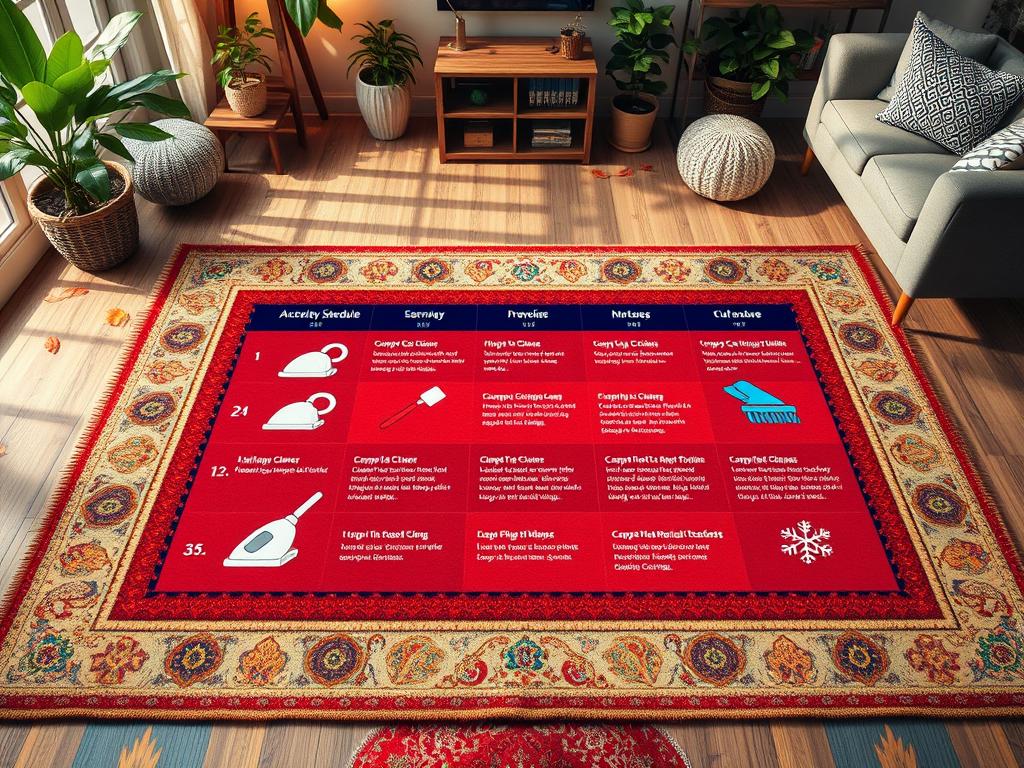
Carpeting adds comfort and beauty to any home. It’s important to keep it looking great and healthy. By setting up a good carpet care plan, you ensure carpets last longer. This plan should factor in how many people live in your home, pets, and how much your carpet is used.
Good carpet care means stopping dirt before it spreads, cleaning regularly, and quickly dealing with spills. Think about when your home is busiest and the seasons. Then, clean your carpets based on that. Every so often, give your carpets a deep clean. This can be a DIY project or done by professionals.
Introduction to Carpet Maintenance
Keeping your carpet in good shape is crucial for your home’s look and feel. By following best practices for carpet care, you improve its appearance. This also makes your living space healthier by cutting down on allergens and dirt. Regular care not only keeps carpets looking great but also extends their life.
Good carpet maintenance includes a few key steps. Regular vacuuming, for example, can remove 80% of the soil that builds up each day. This shows why keeping up with carpet care is so important. Vacuuming daily, especially in areas that get a lot of foot traffic, helps manage dirt and wear.
Barrier mats are another important part of keeping carpets clean. You should have 12 to 15 feet of matting at every main entrance. This helps stop a lot of the dirt and moisture from getting onto the carpet. Keeping these mats clean is essential. They catch up to 80% of soil and moisture, keeping carpets cleaner.
Spot cleaning and deep cleaning are also vital to carpet care. You’ll need to spot clean when there are spills to maintain the carpet’s look. Using the right method, like blotting gently, is crucial. This avoids damaging the carpet fibers. Such care keeps the carpet in top shape between deeper cleanings.
Preventative Measures
Keeping your carpet in top shape starts with good preventative steps. These measures not only protect your indoor carpet but also help avoid wear and tear. They make it easier to keep your carpet clean, saving you time and money.
Using Entry Mats
Using entry mats is an easy but powerful way to care for your carpet. These mats catch dirt and debris at the door, reducing what comes into your house. Have mats at every entryway to keep dirt out and prevent your carpet from getting worn out.
Implementing a “No Shoes” Policy
Creating a “no shoes” rule is another great way to protect your carpet. It stops dirt, small rocks, and other debris from getting inside. Less dirt means less wear on your carpet and a cleaner home overall.
Furniture Pads and Rearrangement
Furniture pads help save your carpet from heavy furniture marks. They prevent sharp dents under furniture legs. Shifting your furniture around now and then spreads out the wear. This keeps your carpet looking good and refreshes your home’s appearance.
- Use entry mats to trap dirt and debris.
- Implement a “no shoes” policy for enhanced indoor carpet protection.
- Use furniture pads and rearrange furniture regularly to prevent indentations.
By following these simple steps, you can extend your carpet’s life, making your home cleaner and more inviting. These habits also reduce the need for frequent deep cleans, making maintenance easier.
Regular Vacuuming
Vacuuming regularly is key to keeping carpets clean and fresh. It removes over 80 percent of daily soil and debris. It also makes your carpets last longer. Using the right vacuuming methods is important, especially in areas where people walk a lot.
Vacuuming Frequency
Having a vacuuming schedule helps keep your carpets in good shape. High traffic spots like hallways should be vacuumed daily or weekly. For places with less foot traffic, every two to three days is enough. This routine keeps the floors clean and stops dirt from building up.
Choosing the Right Vacuum
Choosing the right vacuum cleaner is important. Look for one with a HEPA filter to catch allergens and improve the air. Make sure it has features you need, like adjustable height and strong suction. These help you deal with different carpet types and cleaning issues.
Vacuuming Techniques
Proper technique makes vacuuming more effective. Move slowly and overlap your passes to cover every area well. For tough spots, you might need to go over them a few times. Use attachments for corners and set your vacuum right for your carpet type.
Spot Cleaning and Stain Removal
Quick action on spills is key for carpet care. Cleaning spots right away stops stains from sticking to carpet fibers. Using correct methods and products makes sure stains leave without harming your carpet.
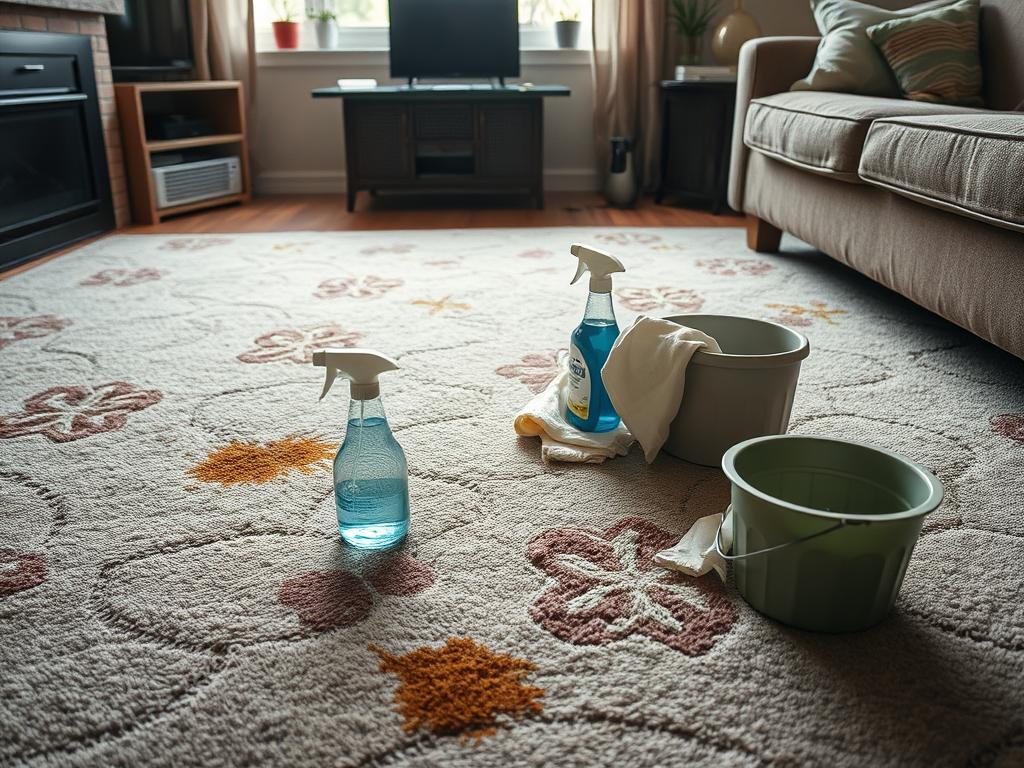
Blot, Don’t Rub
It’s vital to blot spills, not rub them. Rubbing makes stains spread and go deeper into the carpet. Blot gently with a dry, white cloth to soak up the liquid. This keeps the carpet safe while getting rid of stains.
Using Effective Cleaning Solutions
Choosing the correct cleaner is crucial for handling carpet stains. You can pick from store-bought cleaners or homemade mixes like vinegar and water. Always check cleaners on a small carpet section first to avoid fading. For tough stains like wine, specialized cleaners work well.
Pet Stains and Odor Removal
Pet accidents are tough and smelly. Use enzyme-based cleaners for these. They break down the mess and get rid of smells. This stops pets from soiling the same spot again. Quick cleaning keeps your carpet fresh.
Deep Cleaning Carpets
Deep cleaning carpets needs methods like hot water extraction and shampooing. These go beyond simple vacuuming. They reach deep into the fibers to pull out dirt and allergens.
Hot Water Extraction
Hot water extraction, or steam cleaning, pushes hot water and cleaners into the carpet. Shaw Floors recommends it for effective cleaning. It lifts deep dirt and allergens, improving both the carpet and air quality. Professionals should do this every 12-18 months for the best outcome.
Carpet Shampooing
Carpet shampooing also deeply refreshes carpets. A special machine uses frothy shampoo to capture dirt and stains. After the shampoo dries, vacuuming it up leaves the carpet clean and fresh. While DIY is possible, professionals with better equipment do a more thorough job.
Professional Cleaning Services
DIY cleaning can help, but professionals bring the best skills and tools for deep cleaning. They use advanced methods and strong machines for a major refresh. Regular cleaning by experts, recommended every 18 months, matches manufacturer advice and keeps carpets looking great.
Seasonal Carpet Care
Every season brings its own carpet care challenges. Changing your carpet care with the seasons keeps your flooring in top shape. For example, winter means more dirt and moisture, making extra carpet cleaning necessary. Vacuuming often and getting professional cleanings are good. They remove the residues from snow and dirt. It’s smart to use strong doormats at doors to catch debris and moisture.
Spring is the best time for a deep clean. This gets rid of the dirt from past months. Steam cleaning by pros can make your carpets look new again. You can also use home tricks like baking soda for smells or a vinegar-water mix for spots. This keeps things fresh until the next pro cleaning.
In summer, carpets get more use, needing extra care. Use area rugs and strong doormats to help. Vacuum regularly. High-traffic spots need vacuuming two to three times a week, and less busy areas once.
Getting ready in autumn helps protect carpets from heavy use during holidays. Plan for a professional cleaning and use carpet protectants. Moving your furniture around can also avoid uneven carpet wear, helping it last longer.
Keeping up with carpet care through the seasons meets your home’s needs. This keeps your carpets fresh and clean all year.
Creating a Customized Carpet Maintenance Schedule
Your home’s needs are unique when it comes to carpet care. Start by considering how many people live in your home, if you have pets, and your lifestyle. These factors will guide you in setting up a schedule for vacuuming, spot cleaning, and professional cleans.
Households with kids and pets might need to clean up spills more often. Your carpet care plan should fit into your overall cleaning routine. It’s important to follow the carpet manufacturer’s advice too.
Key factors to consider when creating your schedule:
- Daily Vacuuming: Use dual-motor, upright, or backpack vacuums to remove up to 80 percent of dry soil in high traffic areas.
- Spot Cleaning: Immediate attention to spills can protect your carpets from damage and discoloration.
- Quarterly Interim Cleaning: Light traffic areas should be cleaned quarterly, medium-use areas every two to three months, and heavily trafficked areas monthly.
- Deep Cleaning: Schedule hot water extraction or professional carpet cleaning services annually to refresh and sanitize your carpets thoroughly.
Using proper entryway flooring systems can catch a lot of the soil. Doormats at all entrances cut down on dirt getting onto your carpets. Cleaning your carpets at planned times will keep them in top shape and make them last longer.
To keep your carpets looking and feeling good, tailor your approach. Add these steps to your home care to keep your space clean and inviting.
Conclusion
Keeping your carpet clean and healthy is key. You should vacuum high-traffic spots every day. Weekly spot cleaning prevents dust and allergens from piling up. This makes the air in your home cleaner.
Try preventive actions to keep your carpet nice for years. Use entry mats and say no to shoes indoors. Protective treatments help too. Experts at KleanDry suggest getting a professional clean every 12-18 months. This takes out deep dirt and makes your carpet look new.
A good plan covers pet stains, daily dirt, and changes with the seasons. Sometimes, you might need extra deep cleans for special events. Squeaky Cleaners say mixing daily care with expert cleans keeps your carpet awesome. It will last longer and make your home nicer.
Care for your carpet is more than a task; it’s smart. These steps keep your carpets looking and working great. This makes your living space healthier and more welcoming for a long time. Keep up with carpet care for lasting results.

